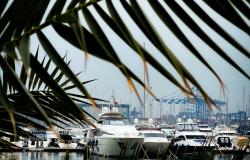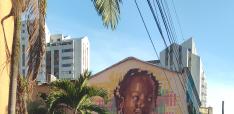Redirected globalisation and Western sanctions on Russia

Sam Pryke explores how globalisation aids Russia.
A feature of globalisation is that it affords the possibility for the redirection of the flows that are integral to it when they are blocked. Take the case of Russia and Russians since the invasion of Ukraine on February 24th, 2022.
Following the invasion, important trade partners, EU countries, the UK, America, Canada and Japan, moved swiftly to impose targeted sanctions on a range of individuals and organisations who have links to the regime of Russian President, Vladimir Putin - notably the ‘oligarchs’: billionaires who wield political and economic power in Russia and beyond. Over 2022 and 2023, wider economic sanctions have been progressively introduced. More limited sanctions, enacted after the Russian annexation of the Crimea from Ukraine in February 2014, were already in place. This has resulted, according to the European Council, in the seizure of €21.5 billion of assets in EU countries alone - the mansions, luxury yachts, even in the UK the football clubs of oligarchs besides other investments. This figure is dwarfed by the €300 billion of assets of the Central Bank of Russia blocked in the EU and G7 countries. With respect to trade since February 2022, the EU has banned Russian exports valued at €43.9 billion and imports worth €91.2 billion.
These sanctions saw trade between Russia and the EU fall by about 50 percent in the period February to December 2022, with a sharper contraction taking place in 2023. This was the cause of a decrease in total Russian exports in 2022 according to World Bank figures (but not those of the IMF). The result, in the estimation of the Bank, was a modest but significant 2.1 percent shrinkage in the Russian economy in 2022. The current estimate is for a further shrinkage of between 0.2 and 2 percent in 2023, a fall exacerbated by a drop in energy prices on world markets. We should also note the severe problems for the Russian economy of being unable to access dollars and Euros. This has seen their banks forced to use less reliable currencies for foreign transactions.
Therefore, aside from the economic strain of the war, the sanctions response of the West has harmed Russia – as they have European economies and peoples with, as usual, the poorest hit hardest. The war has seen what was previously thought impossible: the end of the dependence of European economies and societies on cheap Russian gas and oil. Germany is the paradigmatic case given the size of Russian imports before February 2023. The German federal statistics agency claimed in April 2023 that oil and natural gas imports had fallen from €2.2 billion in February 2022 to €4.2 million in February 2023, a drop of 99.8 percent. So, when the geopolitical and military dimensions of the conflict are factored in, the Russian invasion of Ukraine has seen the most important instance of deglobalisation since the end of the Cold War after the collapse of the Soviet Union in 1991 – one with likely long-term consequences, not least the probable entry of Ukraine into NATO.
However, it is important not to exaggerate the economic impact of sanctions on Ukraine. In particular, EU sanctions have been calibrated to hurt the Putin regime rather than ordinary Russians so agricultural, some pharmaceutical as well as diminished energy exports continue. In the weeks after February 2022, several well know Western companies announced that they were pulling out of Russia, amongst them Nike, Volkswagen and British Petroleum. However, others, notably Nestle, PepsiCo, Philip Morris, Unicredit and Mars, who said they were going, remain a year on. In fact, according to the Kyiv School of Economics, fewer than 300 of the 3350 large foreign companies that have assets in Russia have left as of July 2023 (a further 500 are in the process of withdrawing, more or less willingly). Several, for instance Carlsberg and Dadone, have had the decision taken for them recently by being nationalised with meagre compensation and given to prominent supporters of the government.
To compensate for the loss of Western markets, the Putin government has sort to increase trade with allies to the East, notably India and China. In 2022, bilateral trade with China, Russia’s biggest partner, increased by approximately 25 percent; with India, it grew by nearly 250 percent. In 2023, it has grown more quickly still. With another BRIC member, Brazil, Russian trade went up by a quarter, whilst with Turkey, a NATO if not an EU member, it rose by 93 percent. Russian crude exports to India have involved the use of several little-known trading firms as the Western oil majors have withdrawn their business. Registered in locations like Hong Kong, they have indirectly drawn in the financial involvement of banks like HSBC and JPMorgan Chase according to the Ukrainian government. This success in upping lucrative trade with alternative countries is probably part of the explanation for why Putin was prepared to pull out of the Black Sea grain export arrangement with Ukraine in July. The US State Department has made it clear, notably to Brazilian presidents, that it is unhappy with declarations of neutrality on the war, but for the most part (South African arms sales to Russia were an exception) this has had little impact on trade policy. With respect to oil, the Biden administration wants Russian exports to continue to flow as their priority, with an eye to next year’s presidential election, is maintaining stable prices on world markets.
As for Russian oligarchs, they were doubtless annoyed by the seizure of their prize possessions as their total wealth diminished through sanctions. But the measures have not been as severe as perhaps they feared. In Italy, the unnamed but sanctioned owner of a £700 million super yacht linked to Putin that was impounded last year, has used the opportunity for a costly refit at the Tuscan port of Marina di Carrara. In Britain, a country whose capital acquired the nickname ‘Londongrad’ as it became from the 1990s the favoured location for the oligarchs to live and invest their millions, it has emerged that remaining Russians with links to the Kremlin have been allowed to spend as much as £1 million in day to day expenses, despite ostensibly having their bank accounts frozen. And, contrary to pledges of the British government, they have continued to use libel laws to protect themselves. However, others have left London and other favoured cities, notably Paris and Monaco. Many of the super-rich have relocated to the UAE. There, they have as a nationality helped to revitalise the real estate economy in the wake of Covid. One estate agent alone reported that in the period between February 2022 and July 2022, he sold $1 billion worth of homes to Russians or individuals from ex-Commonwealth of Independent States countries — all of them for more than $5 million. By value, the group accounts for a third of his company’s business. With the flats and villas, schools for their children have expanded and more Russian restaurants have opened in Dubai and elsewhere, adding to the ‘cosmopolitan’ feel of these hubs for the world’s mega-rich.
The reasons for the relocation are obvious. ‘What Russian oligarchs are looking for now, is secrecy and anonymity beyond the reach of international sanctions’, said Matthew Page, of the Carnegie Endowment for International Peace, a Washington think-tank. Despite some pressure from the US to clean itself up, the UAE was added in March 2022 to the ‘grey list’ of countries with deficient anti-money laundering or terrorist financing regulations by the Financial Action Task Force (FATF). ‘For Russian sanctioned individuals or criminals, your money is safe there in a bank earning interest or in property, your yacht is safe in a berth’, according to Page.
Other, probably somewhat less wealthy, Russians have brought property and moved from London to Turkey and Cyprus or emigrated directly from Russia itself. IT experts, some hostile to Putin, others indifferent, quickly left Moscow and Saint Petersburg for Georgia to join an established Russian business (and now dissident) community in Tbilisi. More surprisingly, significant numbers have migrated to South America to restart their web platform companies. Those with some cash but no wish to settle abroad indefinitely are holidaying in record numbers in Thailand and Turkey, rather than Cuba and Greece. There, they can use Russian alternatives to Facebook and Instagram to upload photos of friends and family, or, without too much trouble, continue to access the US social media platforms.
Finally, it is significant that the Wagner Group, the mercenary, really criminal, branch of the Russian government, presently relocated in Belarussian following an aborted uprising in June 2023, has been able to expand its activities since February 2022 in the Middle East, across Africa (most recently in Niger) and, of course, in Russian and Ukraine.
These re-directed global flows of trade, investment, people and communication would have been inconceivable in the midst of the Cold War. Then, there was genuine closure within respective blocks of US and Soviet influence across the world. The globalised world in 2023 is a rather different place.
Dr Sam Pryke is senior lecturer in Sociology at Wolverhampton University. He is currently writing a book on deglobalisation.
Photo by Enes can Acikgoz


